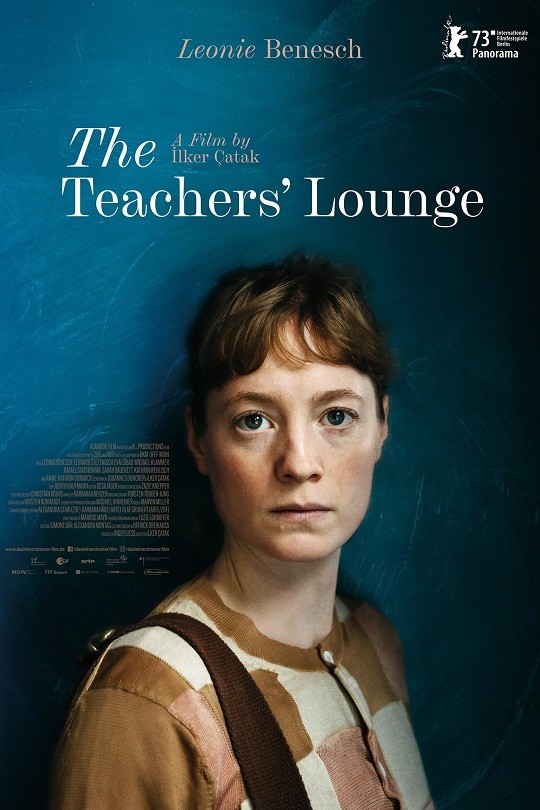The Teachers' Lounge
Introduction
Keeping pace with the list of Oscar Nominated films in the Foreign Film category, I finished watching the German film The Teachers’ Lounge which is Germany’s Official Entry to the Academy Awards this year. The films from Germany have always presented a solid case in the Foreign Film category with ‘All Quiet On The Western Front’ being a prime example. And I did expect a similar impact with The Teachers Lounge whose premise seemed like a searing commentary on classroom politics veiled as a thriller. Schools as we know are an institution of learning but in many ways is also a central body of power and authority, known to shape minds as per the society norms. And while there shouldn’t be any distinction based on caste, creed or gender, there is always a little hierarchy within the organization, knowingly or unknowingly that does distinguish children and their parents based on the same. Yet, the fine line that it often treads, it remains the best bet to cultivate minds, until there is a conscious revolt. And that is something that The Teachers’ Lounge seemingly dealt with, does it manage to impress, let’s find out.
Story & Screenplay
The Teachers’ Lounge follows the story of an idealist teacher who takes it upon herself to crack the case behind multiple thefts that are taking place in the school campus. This until mayhem is what follows. The story here is a simmering buildup of rage pitted against an organization who does have a zero tolerance policy towards theft while conveniently(or not) zeroing in on folks based on their discrimination of caste, creed and nationalities. And this dynamics, wrapped in a searing commentary on the disparity of classroom politics does make for an engaging drama that has a soul of a thriller. The screenplay standing at just under a 100 minutes is taut with exceptional levels of buildup before all hell breaks lose.
The drama opens with an investigation of theft that transpires on the school campus wherein a group of panelists question Ali, a boy of Turkish origin(remember that this is a German school and the drama is set in Germany). Amongst the panelists is an idealistic teacher who has just joined the school and hasn’t quite formed a bond with anyone. As a result, she is the first one to defend the supposed accused child being oblivious to the power dynamics of the school and her equation with other staff members. She is somewhat validated when Ali’s parents justify the supposed amount retrieved, that does ‘classify’ Ali as ‘innocent’, although the picture isn’t entirely clear of his innocence as well. And this is when the protagonist decides to undergo a ‘sting’ operation to nab the culprit.
The proceedings blur the lines between right and wrong with respect to both the parties. For instance, the ‘sting’ operation was a breach of privacy on the part of the protagonist who happened to zero in on a staff member, who is essentially a soft target given that there is only minor circumstantial evidence against her. But on the flip side, the protagonist begins to spoil her bond with Oskar, a bright young child who happens to be the son of the accused thereby spoiling the initial bond that he shared with his teacher. As a result, Oskar turns his intelligence against his teacher by influencing minds of his friends, all of whom collectively begin to revolt. Now the other side of the argument remains that school as an institution should be utilized for study and not be resort to politics by the students. So this dilemma is often put to great use by the writers while presenting situations in the drama without taking any sides.
You have got to remember here that the protagonist is essentially a pawn in the larger scheme of things, having got into a pickle due to her idealistic nature. She tries to be fair and sensitive towards everyone around her but she gets caught up in her own web of trying to please everyone. The juxtaposition of the situation is in the buildup itself wherein you do not get a clear picture on who the culprit is, and as a result cannot completely decide on which party is wrong. As a result, while there is empathy for the protagonist, you can’t also help but think that her antics are wrong too and that there has indeed been a breach at her end. The revolt and the chaos that does ensue after the terrific buildup is a result of her actions as much as the students who frame her without knowing the entire truth. Yet, her character is a perfect contrast to Osker’s mother while both find themselves in similar situations albeit different sides of the same spectrum. And therein lies the beauty of the writing that refuses to take any sides at all.
I was a little on the fence with respect to the final act particularly with one character getting a heroic send-off after the turn of events that transpired. The clue for me lay in the rubik’s cube that is a symbol of a tangled puzzle until you get to the solution in a practical manner. And while Osker was gifted the Rubik’s cube under the pretext that the puzzle will continue to get tougher(after demonstrated to a finishing touch on only one side by the protagonist), he solves the puzzle in front of his teacher only to represent transparency. But at the same time, the commentary at the end was also slightly more political than what would have met your eye. The exersion of power by an institution against the ones revolting without giving them a fair chance to present their case was also a commentary on autocracy(familiar enough?). All of it is presented in a gritty screenplay that has the soul of a thriller.
Dialogues, Music & Direction
The dialogues are conversational but quite impactful with what it wished to achieve at the end of the day. The BGM is outstanding almost adding a nail biting urgency to the proceedings and veiling it as a thriller. The cinematography captures some stunning frames that adds to the edginess of the drama. The editing is sharp and crisp, allowing the drama to simmer without any abrupt cuts and later allowing chaos to creep into the picture. Director Ilker Catak does a magnificent job in constructing a complex drama while never swaying the narrative towards any particular party. He treads on a fine line balancing the arguments and the situations while presenting a searing commentary on the disparity of classroom politics almost like an undercurrent. The direction was quite splendid here while tackling a very tricky subject.
Performances
The performances are incredibly good by the ensemble cast. Sarah Bauerett as Vanessa and Michael Klammer as Thomas are welcome additions to the screenplay as folks of the staff who do not have complete faith on the protagonist while also bound by their duties of representing the institution as a single team. Eva Lobau as Kuhn is perfectly cast as a character being a dilemma on whether she is playing a victim card or otherwise. Leonard Stettnisch as Osker is incredibly good while presenting a picture of agony and angst. His blank stares are intimidating while also a part of you wishes to embrace him in hope that everything would fall in place eventually. Leonie Benesch as Carla is stunningly good as an idealist caught in the warp of her own sensibilities. She is natural to the core while expressing beaitifully through her body language(remember the ‘scream’ session that she exercizes to let off her accumulated steam) and eyes.
Conclusion
Germany’s Official Entry to the Academy Awards this year, The Teachers’ Lounge is a searing commentary on the disparity of classroom politics wrapped in a complex and provocative drama that comes with my highest recommendation.




